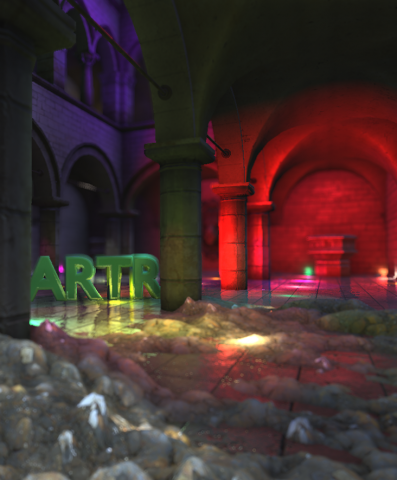Thank you all for participating. It's been a blast!
Hall of Fame 2022 is online.
Subject and Aim
The course teaches fundamental real-time rendering techniques like tessellation, deferred shading, and screen-space effects, and discusses bleeding-edge topics like real-time global illumination, physically-based rendering, and optimizing GPU performance.
The goal is to give you a firm understanding of all constituents of a modern real-time rendering engine.
Communication
The whole communication runs over the TUWEL course. Information regarding the exercises are also available on TUWEL.
Please register for the course on the TISS-Page!
In case of problems with TISS, TUWEL and for personal matters, feel free to send us an email: artr@cg.tuwien.ac.at
Schedule
The following table lists all dates for lectures, assignment deadlines, and solution presentation and group discussion events.
We plan to give all (except the introductory) live lectures on-site in Seminar Room FAV 05 (formerly: Seminarraum 186), in Favoritenstr. 9-11 / 5th floor. We will provide the option to participate via Zoom, too, i.e., all live events will be hybrid.
The hybrid mode also applies to our "solution presentation and group discussion" events, but it would be great if we could all meet in person at least for these four events. Please note that your participation in these four events is mandatory.
|
|
Participants are encouraged to make themselves familiar with Vulkan, since all assignments will be based on it. No in-depth knowledge is required, though, since a convenience framework is provided. Suggested learning resource: Vulkan Lecture Series | |
|
|
Assignment #1 goes online | |
| 08.03.2022 | 13:00-15:00 (c.t.) | Johannes Unterguggenberger (live lecture, Zoom only) Introduction, Rendering pipeline re-cap, Normal Mapping re-cap, Introduction to the exercise framework. |
| 15.03.2022 | 13:00-15:00 (c.t.) | Johannes Unterguggenberger (live lecture, on-site + Zoom) GPU Synchronization using Vulkan |
| 22.03.2022 | 13:00-15:00 (c.t.) | Stefan Ohrhallinger (live lecture, on-site + Zoom) Geometry and Tessellation |
|
|
Assignment #2 goes online | |
| 28.03.2022 |
|
Deadline for Assignment #1 |
| 29.03.2022 | 13:00-15:00 (c.t.) | Lukas Lipp (live lecture, on-site + Zoom) Deferred Shading |
| 05.04.2022 | 13:00-14:00 (s.t.) | Assignment #1 solution presentation and group discussion (compulsory attendance) |
| 05.04.2022 | 14:00-16:00 (c.t.) | Michael Wimmer (live lecture, on-site + Zoom) Shadow Algorithms |
| 26.04.2022 | Bernhard Steiner (recorded lectures, TUWEL-only) Physically-Based Shading | Order-Independent Transparency |
|
| 26.04.2022 |
|
Deadline for Assignment #2 |
|
|
Assignment #3 goes online | |
| 03.05.2022 | 13:00-15:00 (s.t.) | Assignment #2 solution presentation and group discussion (compulsory attendance) |
| 10.05.2022 | 13:00-15:00 (c.t.) | Markus Schütz (live lecture, on-site + Zoom) Point Cloud Rendering |
| 17.05.2022 | 13:00-15:00 (c.t.) | Philipp Erler (live lecture, on-site + Zoom) Physics |
| 23.05.2022 |
|
Deadline for Assignment #3 |
|
|
Assignment #4 goes online | |
| 24.05.2022 | 13:00-15:00 (c.t.) | Christian Freude and Markus Schütz (live lecture, on-site + Zoom) Screen-Space Effects |
| 31.05.2022 | 13:00-15:00 (s.t.) | Assignment #3 solution presentation and group discussion (compulsory attendance) |
| 14.06.2022 | 13:00-15:00 (c.t.) | Lukas Lipp (live lecture, on-site + Zoom) Real-Time Ray Tracing |
| 21.06.2022 |
|
Deadline for Assignment #4 |
| 28.06.2022 | 13:00-15:00 (s.t.) | Assignment #4 solution presentation and group discussion (compulsory attendance) |
Assignments
The lecture is accompanied by assignments that cover advanced but fundamental techniques of real-time rendering. Assignments are programming exercises in frameworks based on (modern) C++ and Vulkan. Ready-to-use versions of the frameworks and the assignments will be provided for Visual Studio 2019 on Windows, but Visual Studio 2022 and even development on Linux via CMake should be possible.
All assignments will be available on TUWEL at the dates stated above.
| Assignment #1 | Synchronization, Normal Mapping Synchronization in Vulkan, Tangent Space, Blinn-Phong Shading |
10 points (+10 bonus points) |
| Assignment #2 | Hardware Tessellation PN-Triangles, Adaptive Tessellation, Displacement Mapping |
30 points (+20 bonus points) |
| Assignment #3 | Deferred Shading, Physically-Based Shading Deferred Shading, MSAA, Tile-Based Deferred Rendering, Physically Based Shading |
30 points (+19 bonus points) |
| Assignment #4 | Screen-Space Effects Screen-Space Ambient Occlusion, HDR Rendering + Tone Mapping, Screen-Space Reflections, Temporal Anti-Aliasing, Real-Time Ray Tracing |
30 points (+22 bonus points) |
Every assignment will feature a set of basic tasks and bonus tasks. Solving bonus tasks will allow you to earn more than 100% of the regular point maximum for this assignment. With this, you may compensate lower percentages in other assignments.
Grading
| Grade | Points |
|---|---|
| 5 | 00 - 49 points |
| 4 | 50 - 62 points |
| 3 | 63 - 74 points |
| 2 | 75 - 87 points |
| 1 | 88+ points |
To be perfectly clear on this: You will not get a positive grade if you do not present in one of those four events, even if you have 50+ points.
Note: Your participation and constructive contribution to the group discussions will influence your final grade. Constructive participation can improve your final grade, while a lack of participation will impair your final grade. It is not important that you present correct solutions -- it is just your participation that counts. These events replace individual submission talks, so use them to show us that you are the author of your submitted solutions and let's learn from each other in profound group discussions.
Course materials
- Real-Time Rendering, Fourth Edition, by Tomas Akenine-Möller, Eric Haines, Naty Hoffman, Angelo Pesce, Michal Iwanichi, and Sébastien Hillaire, A K Peters/CRC Press, 2018
- OpenGL Insights, First Edition by Patrick Cozzi and Christophe Riccio (July 23, 2012)
- Graphics Shaders: Theory and Practice, Second Edition by Mike Bailey and Steve Cunningham (Nov 8, 2011)
- OpenGL 4 Shading Language Cookbook, Third Edition, by David Wolff, Packt Publishing, 2018
